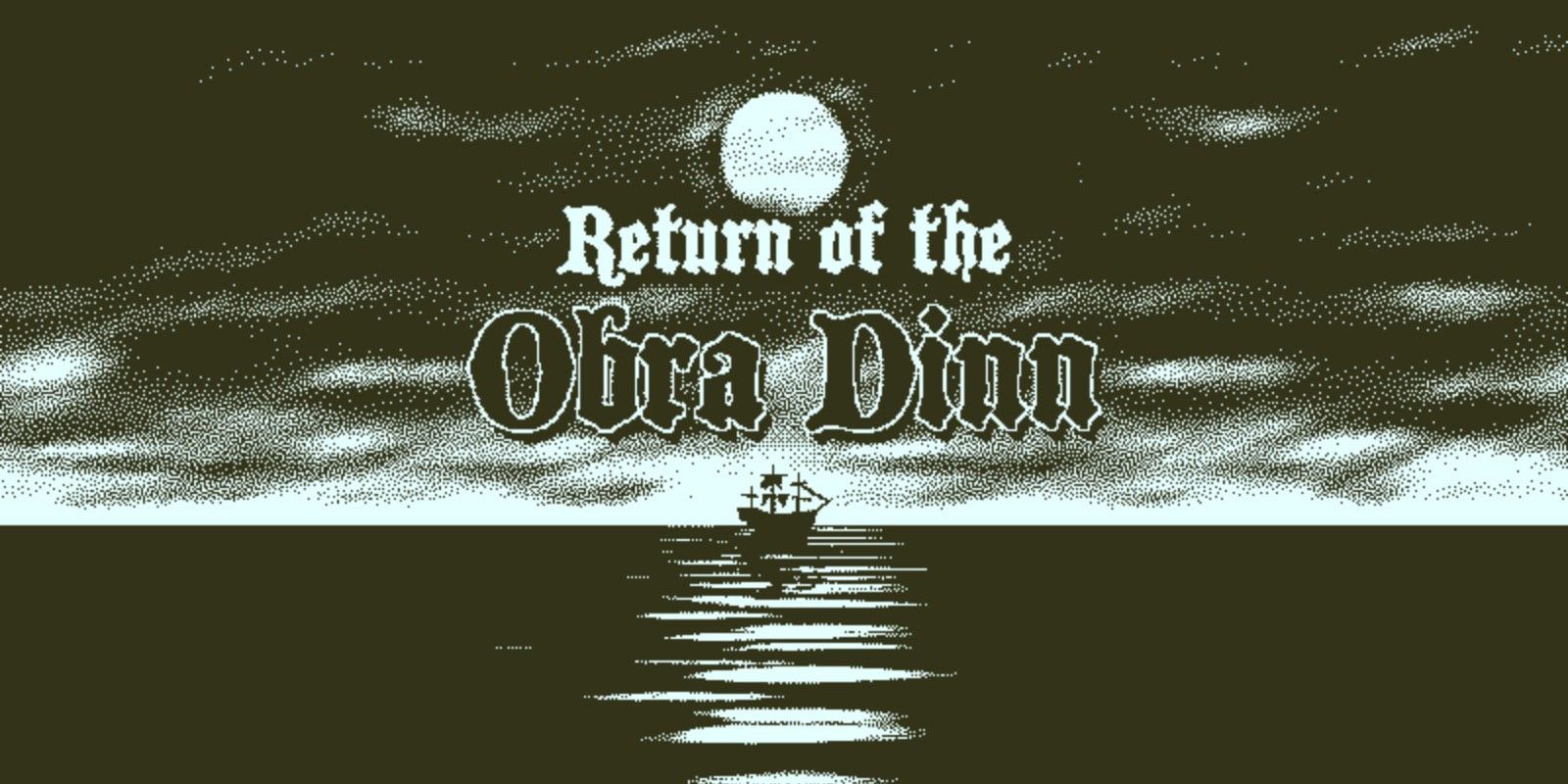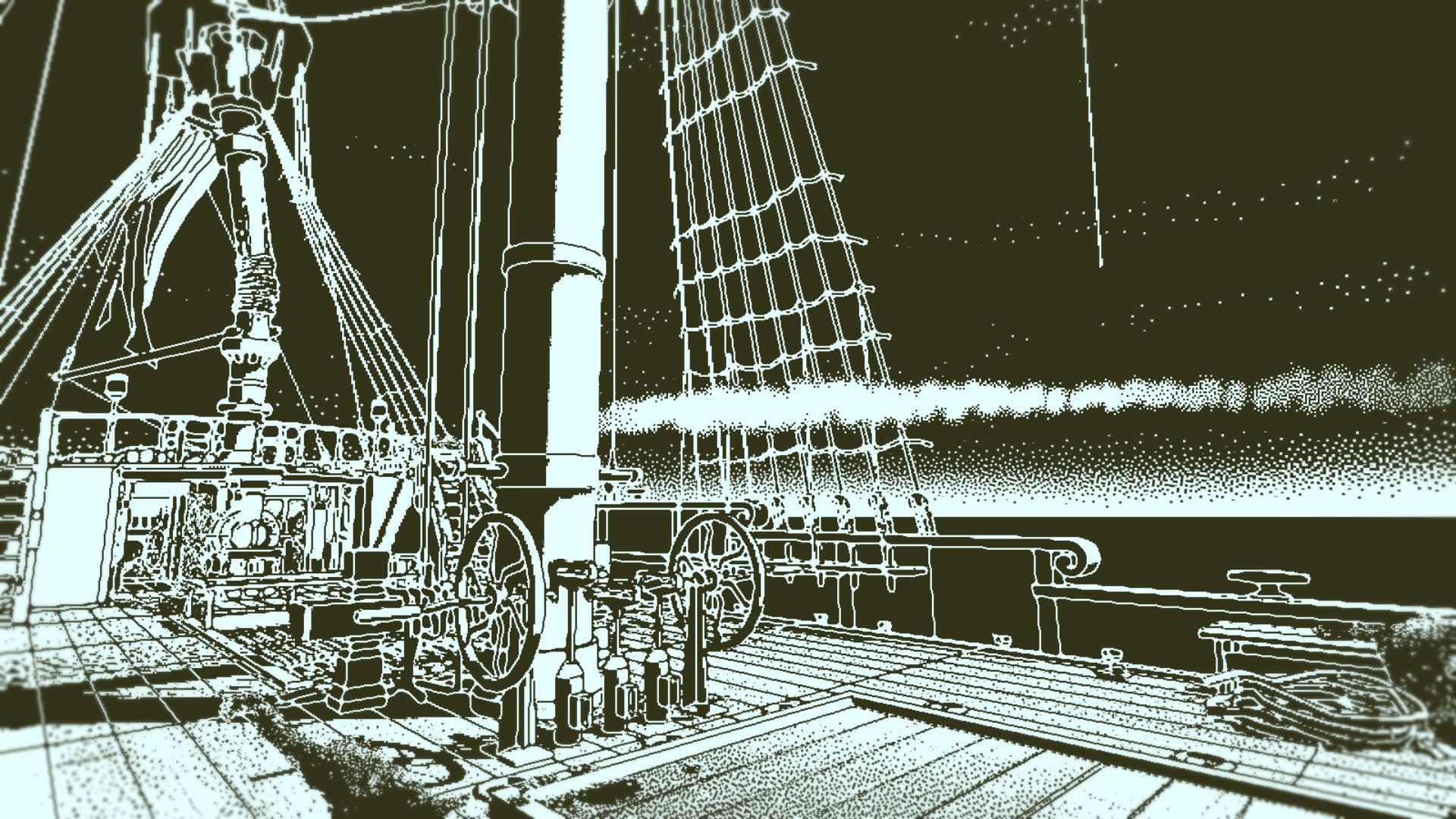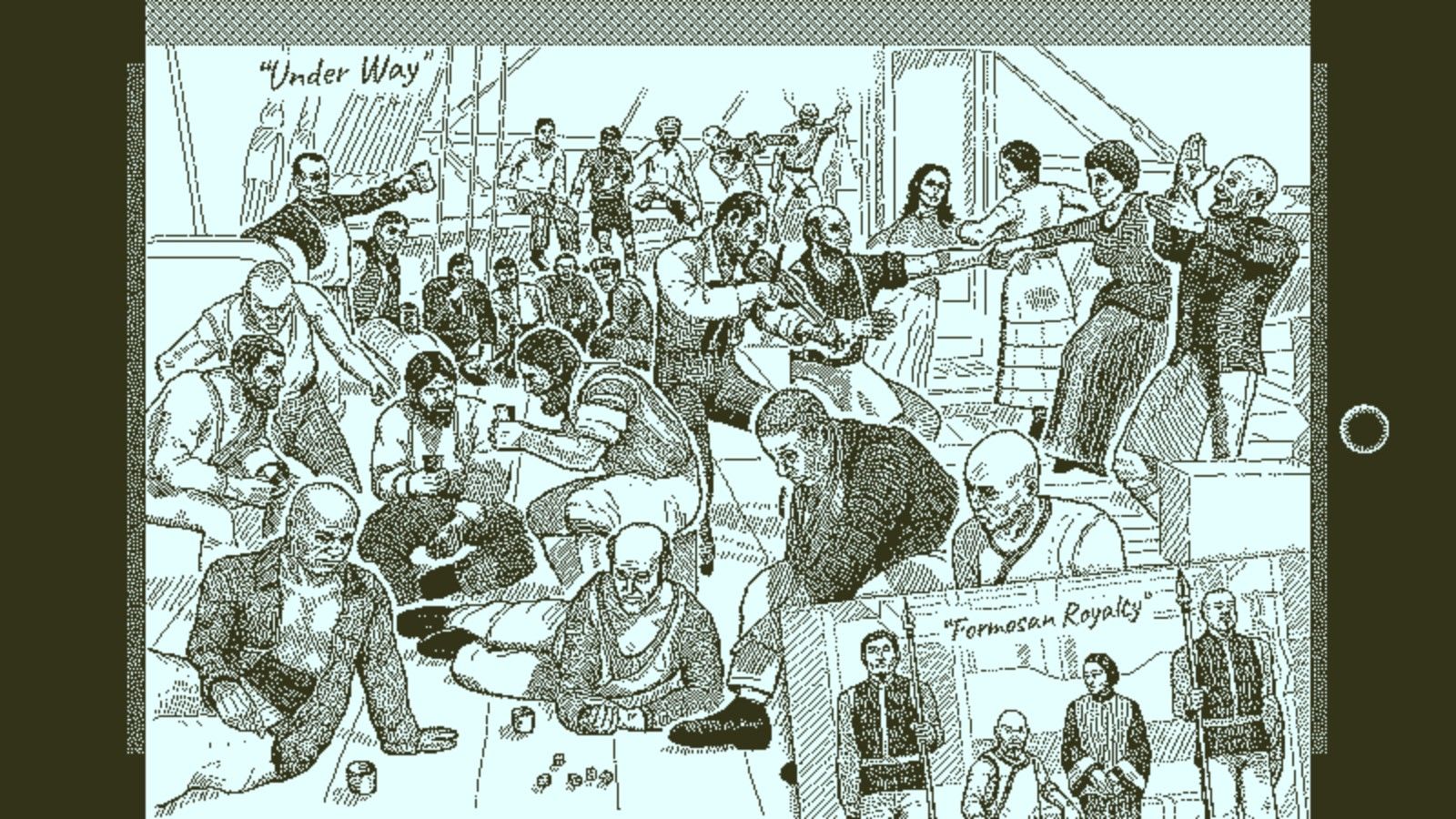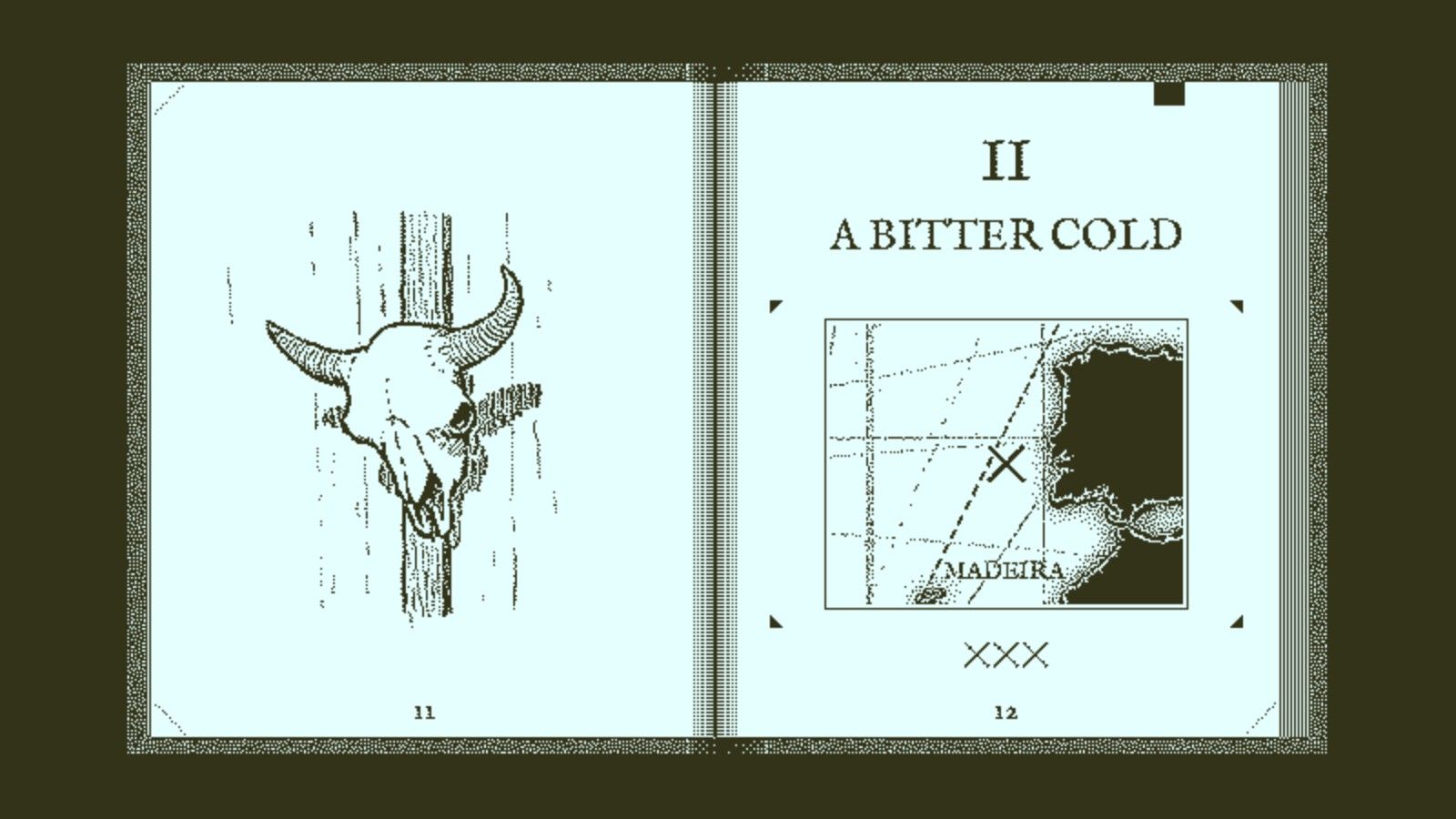
The truth seems more obvious in retrospect. That’s one of the main takeaways from Return of the Obra Dinn, a maritime detective adventure where the primary game mechanic is close, patient observation. Lucas Pope’s long-awaited followup project to the definitive border-crossing bureaucracy sim Papers, Please (a title which recently shuffled back into conversation as the clear inspiration for Not Tonight), the game positions the final years of the age of sail as a backdrop to tell a grim story of death and despair, organized and pieced together by the player.
Taking on the role of an insurance investigator, players are tasked with summarizing the fates of all 60 souls aboard the now unmoving vessel, determined by combining a list of gruesome ways to die with names and faces. Equipped with a magical necromantic pocket watch and a mostly-empty book to document the tale, the player can enter the final moments of a specific death during different stages of the ship's doomed voyage. Essentially, this means that players can walk around these frozen encapsulated memories, scrutinizing faces, following trails of blood, looking at dead and dying bodies flung through the air or cleaved in twain, and eavesdropping on a few scant bits of conversation. The end result is always the same: name each participant, describe how they died and, if needed, describe who killed them. The "why" isn't mechanically relevant, but well worth ruminating on all the same.
Related: Immortal: Unchained Review - A Souls-Like With Guns, Shackled to Conventions
If you’re thinking of the board game Clue, that only gets partway to the inherent thought exercises and techniques that will be put to the test. Like Clue, there are certain deaths that can be solved through a process of elimination (or can at least be functionally handled that way), but considerably more important is a sense of close and attentive observation, which makes for a methodical experience that feels largely internal. Sometimes the main character feels a little like Sherlock Holmes, pacing through still-life diorama memories, lost in thought and connecting the frozen dots together. Luckily, players receive metered feedback on their progress through a highly satisfying confirmation sequence when three fates are correctly defined — at later stages in the game when progress seems to slow to a crawl, this verification might prompt a player to victoriously leap out of their chair.

Return of the Obra Dinn utilizes an eye-catching monochromatic style based on the visual qualities of yesteryear computing, the essence of which aligns with the much-older high-seas storytelling, anachronism to anachronism. It’s something that may put off some players, and also causes a strange murky haze to attach to peripheral objects, which can be slightly frustrating if it makes certain scenic details seem unclear. It’s a spirited stylistic approach, but players who loathe the “old-school Macintosh” default theme can at least shift to a few other monochromatic versions, if they prefer.
The overarching plot has some surprises, many beautifully tragic moments which coincide with an “A-ha!” puzzle-solving flourish, and even a few little niggles here and there (a handful of specific character fates seem to beg for trial-and-error approaches, though your mileage may vary on that front). It's not the type of story where every detail eventually gets fleshed out, even at 100% completion, as the bulk of its action happens in your mind, ably blending any available assumptions and summoned logic you bring to bear. Sometimes it feels like a cross between deductive reasoning and digital séance, with players using any scrap of information to divine a character’s intention, including their clothing, facial expressions, specific phrasings and accents, or even the body language in the Where's Waldo-like sketches in the front of the book. Although the story contains many grisly scenes, the overall tone feels generously humane and sympathetically maudlin, despite the fact that it's hard to parse an insurance investigator as any kind of hero.

The music also happens to be exceptional, positioning orchestral motifs throughout each chapter which provide additional thematic texture to the minimalist palette. The effect is synergistic, something like how an early 1900s movie about an older epoch feels strangely fused to that history, or best captures it; Return of the Obra Dinn is the video game equivalent of meticulously age-stained paper and other faux-antique feelies of the highest quality. Which is to say, it doesn't feel like a trite retro bauble, but a treasured work made with love and intelligence by a dedicated craftsman to tell an effective, memorable, and transporting story.
If anything, the main glaring issue regards the memory mechanic itself, in that “hopping” between different dead characters must always be done in-game and cannot be immediately summoned through an organized list or menu. Certain character deaths can only be found nested within other characters, which means that players often have to run through multiple memories in search of a stray detail, shambling to and fro on the Obra Dinn’s creaky decks looking for the correct corpse to activate with the pocket watch.

Still, even this potential flaw feels connected to the most crucial requirement to reckon with the game: patience. Other interactive fiction games might attempt to dazzle or distract the player with platforming, inventory puzzles, forked paths, or brief action sequences, but the majority of time here is spent pondering the truth. Expecting full completion to take most players approximately eight to ten hours, Return of the Obra Dinn is best played in a one or two sittings, since time has a way of transforming memories, which may add undue challenge to the game.
Overall, it's a singular and strange experience, which asks a lot of players who may be inexperienced with interactive fiction games. In its most challenging moments, players may feel completely lost at sea, wondering why progress isn't being metered at a consistent rate, but that's an inefficient approach to appreciate the game. Return of the Obra Dinn can be tough, even unfriendly to those who lack requisite patience, but it's an incredibly rewarding and memorable journey.
More: Reigns: Game of Thrones Review - A Neat Adaptation
Return of the Obra Dinn is out now on PC and macOS for $19.99. We played the PC version for review.
from ScreenRant - Feed https://ift.tt/2AtzGb0

0 Comments